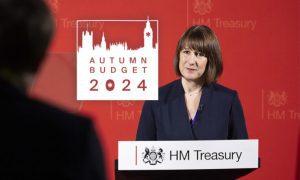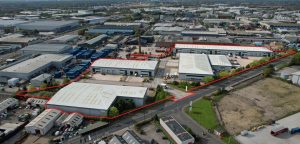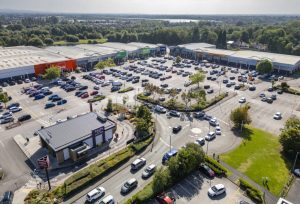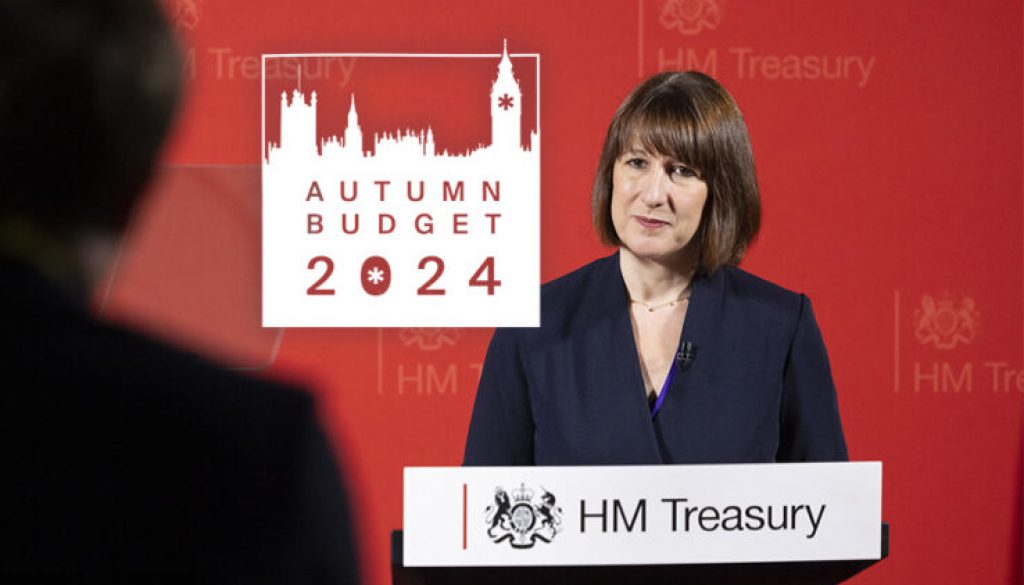2024 has been a pivotal year for the UK commercial property sector, characterised by economic recovery alongside lingering geopolitical and financial uncertainties. But there has been some recovery in key sectors, which we’ll dive into shortly.
This review analyses the performance of key commercial sectors, including:
- Industrial and logistical
- Office space
- Retail warehousing
We also examine regional trends, investment dynamics, and tenant activity to provide a comprehensive market review as we approach 2025.
Economic Backdrop
The UK economy showed signs of resilience, expanding by 0.7% in Q1 and 0.5% in Q2. Inflation stabilized and reached 1.7% in September, which was close to the Bank of England’s target rate. This was supported by falling energy and airfare costs.
Fiscal tightening and geopolitical uncertainties dampened business confidence somewhat. However, the Bank of England implemented its first interest rate cut since 2020, reducing rates to 5.00% in August, with further adjustments anticipated in 2025 as GDP growth is forecast to double to 2%.

We’ll now look at the industrial and logistics sector:
Industrial and Logistics Sector: Leading the Market
The industrial and logistics market is showing signs of robust growth. In Q3 of 2024, occupiers took up 9.3 million sq ft of industrial and logistics floor space. Total take-up in 2024 exceeded 26.6 million sq ft in 2024, bringing the year-to-date total to 11% below the total for 2023.
Furthermore, there were also rising vacancy rates in Q3 of 2024, rising to 7.3%, up from 6.9% in the previous quarter. Vacant spaces are predominantly second-hand units that fail to meet modern occupiers’ requirements for energy efficiency and fit-out.
In particular, regions such as South Yorkshire saw an increase in vacancy rates from 2.1% 2 years ago to 11.5%. Wales and Scotland also saw modest vacancy rate rises.
Investors increasingly favour cross-dock warehouses, urban logistics, and outdoor storage, capitalising on e-commerce growth and urbanisation trends.
Key investment transactions in 2024 have included the RN3 Partners acquisition of THG’s 1 million square feet Manchester Airport City campus Icon Business Park development, sold by THG.
Premier Park at Trafford Park was acquired by M&G Real Estate, from Lothbury IM, in October 2024. The sale was around £45m, which reflects a net initial yield of around 3.50%. The asset is an ultra prime multi-let estate with 62% of the income subject to a lease events within the next 24 months, therefore, the reversion is achievable in the short term with passing rents significantly below the market rent.

Earlier in the year Brookfield AM acquired the Co-Op distribution centre in St Helens for £59m, reflecting a capital value of £92.00 per sq ft and net initial yield of 5.80%.
Office Market: A Mixed Bag
The office sector faced significant challenges in 2024, particularly in London, where remote work trends and elevated vacancy rates persisted.
Despite this, the North West saw modest growth, with occupiers prioritising high quality, sustainable spaces. Demand remains strongest for Grade A properties with certifications such as BREEAM, reflecting a shift towards ESG-focused real estate.
Opportunities have emerged in refurbishing and repurposing underutilised office spaces, particularly in major regional hubs, as businesses increasingly seek flexible solutions in central business districts.

Investment transactions in the North West, in excess of £20m in value were at a low level. This is mainly due to the lack of ‘best in class’ assets being available/offered to the market.
Recently in Q3 2024, Landsec acquired the remaining 25% interest in MediaCity from the Peel Group, which includes the Tomorrow building. The site is mixed use and creative industry led, providing Grade A facilities. Both Ship Canal House (82 King Street) and Arkwright House in Manchester have traded, with both offering core plus opportunities to add value through refurbishment and asset management with existing occupiers.
Seneca acquired 55 Princess Street at a large discount to the original quoting price, from ABRDN.
Northern Group were the most active buyer in Manchester, swooping in on opportunities where they can look to integrate immediately or in due course their in-house ‘COLONY’ flexible workspace service. Acquisitions to date in 2024 include the Siemens building at Didsbury Technology Park, the DKNY Building (76 King Street) and 19 Spring Gardens. All shrewd opportunistic acquisitions with a strong upside of increasing the investment value.

Retail Warehousing: Resilience in Convenience
Retail warehousing displayed stability, driven by demand for convenience-oriented formats such as retail parks and supermarkets. However, a few big new brands deteriorated from the high street, including Ted Baker, Homebase and The Body Shop.
Nonetheless, the most significant occupational activity in the UK retail out-of-town market for several years took place during Q4 2024. Retail is on course to be the top-performing property asset class in 2024!
The stability reflects tenant confidence in well-located properties catering to mid-market and discount retailers. While consumer sentiment softened late in the year, structural demand tailwinds supported rental growth in this segment.
Some key investment transactions include the sale of Snipe Retail Park in Ashton under Lyne for £62m. The asset is anchored by B&Q, Pets at Home, Next and Tapi, and was acquired by CBRE Investment Management from Orchard Street Investment Management.

The Peel Centre in Blackburn was sold in June 2024 by PRUPIM for £22.6m, reflecting a 7.50% net initial yield. The asset provided a WAULT of 12 years and the average overall passing rent was sub £10.00 per square foot, providing an attractive reversion and low site cover offering future development opportunities.
Food stores were more thin on the ground, possibly due to the fact that most existing assets are either owner occupied or owned in large portfolios from specific funds and REIT’s. However, the Tesco Extra in St Helens traded for £53.8m (7.00%) and the Sainsburys in Fallowfield sold for £32.5m.
Regional Performance: The North West Outpaces the Rest
The North West outshone other regions, supported by its strong industrial market.
The region capitalized on nearshoring trends and its strategic logistics networks.
In contrast, the South East experienced subdued activity, hindered by high land values and planning constraints. This regional disparity highlights evolving opportunities for investors seeking value in the UK’s commercial property market.
Investment Dynamics: Opportunities in Recovery
UK commercial property investment volumes reached £29.4 billion in 2024 to date, reflecting a cautious market amid elevated borrowing costs. Despite this, these are so far a mirror image of 2023—but with a strong end to the year before Christmas, we should finish on a high.
Investment opportunities seem strongest in urban logistics, retail warehousing, and some ‘best in class’ office spaces.
Looking Ahead to 2025
Despite the potential challenges following a Donald Trump re-election, the global economy as a whole is expected to remain relatively resilient. It is argued whether 2025 will be a year to thrive, or will it be one to strive, but we remain upbeat given the inferior alternative investment returns in bonds and in the stock market.
Growth in the UK is likely to increase and the world economy is forecast to grow by around 3% in 2025, similar to the rate of growth in 2024. Whilst it’s not going to accelerate aggressively, at the same time it’s not going to fall and will actually move forward. Average wages are currently rising faster than inflation so living standards should improve slightly over the next year. This is a positive.
Central banks will continue to lower interest rates over the next year. Capital Economics predicts that the Bank of England base rate will end 2025 at 3.75%, before dropping to a cyclical low of 3.50% in early 2026. This is a positive.
The UK commercial property market inevitably faces continued challenges in 2025, including geopolitical risks, fluctuating inflation, and evolving occupier needs.
It will be interesting to see how the likes of the retail sector (very large employer) and some of the multiple logistics and manufacturing occupiers are affected by the minimum wage increases combined with the employer’s national insurance rate increase, which will have a significant inflationary impact on wage bills and in turn these increases in costs to occupiers will have an impact for decision making on new property leases, renewals and break clauses.
Despite this, buying opportunities identified in 2024 remain strong, particularly in industrial, logistics, Grade A ‘best in class’ offices and retail warehousing. As supply constraints persist, rental growth is expected to accelerate, supported by structural demand for high-quality, ESG compliant assets.
Big Box logistics looks slightly saturated in the North West, with a high supply rate and reduction in occupier enquiries in Q4 2024. However, the prime yield for Prime Distribution / Warehousing (15 years income, Open Market Rent Reviews) compressed in December 2024 at 5.25%, by 25bps from earlier in the year. In the same month of December, but in 2019 pre COVID lockdown era, the yield was 4.25%. Returns therefore haven not drifted too far out for longer term investors, but at the same time a 100 bps shift in yield in this time period is still attractive enough for developers to speculatively build out assets – all subject to build costs and of course, the occupational demand and market dynamics.

Multi-let industrial remains resilient with a lack of new build supply in this sub sector and with the lack of supply will come an increase in rental levels with competitive occupier demand. Holders of such assets in general seem to be undertaking asset management plans rather than looking to sell an asset ‘leaving something in it‘ for a purchaser, so any on market investment acquisition opportunities remain scarce. If multi-let industrial assets become available, they’ll be snapped up at strong levels – as seen with Premier Park, Trafford (c£45m), Stockport Trading Estate (£23.8m) and Radway Green, Crewe (£13m). Secondary estates in particular provide strong potential. The yield in November 2024 was 6.50% to 7.00% for secondary estates, yet the year prior to COVID/national lockdown this was 5.75%. Whilst past performance is not a guide to future performance, nor a reliable indicator of future results or performance, it feels that due to a complete lack of available secondary multi-let estates available (in addition to a short development pipeline) then yield compression at sub 6.50% to 7.00% is likely in 2025.
Offices provide an ongoing opportunity as stated in our last annual review blog late in 2023. The same theory applies; if you acquire at a low capital value which allows a refurbishment or repositioning scheme to be absorbed in a future exit price, then offices are an exciting play – in key city centres such as Manchester and Leeds (covering the North here). Occupiers remain very interested in a physical workplace and that workplace needs to tick more boxes than it did 5 years ago. Assets need to be ESG compliant which needs to focus on wellness and energy efficiency for occupiers. UK institutions have been net sellers in the office sector post COVID-19, however, we believe that by the end of 2025 there will be institutional buying activity in this sector and it will be in excess of £20m-£30m for each transaction. The workplace is not going away, and we believe that the workplace is getting better, therefore we could see yield compression occurring for ‘best in class’ this year. In November 2024, the yield for major regional offices providing 5 years income was 7.50%, and for 10 years income this was 6.50%. Compare this to London City prime and London West End at 5.50% and 4.00% respectively, the margin between major regional cities (such as Manchester) and London is too wide – meaning that this gap should be bridged a little more next year as better quality assets are traded.
Wildbrook remains at the forefront of the market developments, offering deep sector expertise and tailored advice to clients navigating this dynamic environment. Contact us today to find out how we can help you and it would be great to get a call or meeting booked in as soon as possible to discuss your investment purchase and sale requirements.
All the very best for the New Year and we look forward to working with existing and new clients in 2025, for what will be year 7 of Wildbrook.




